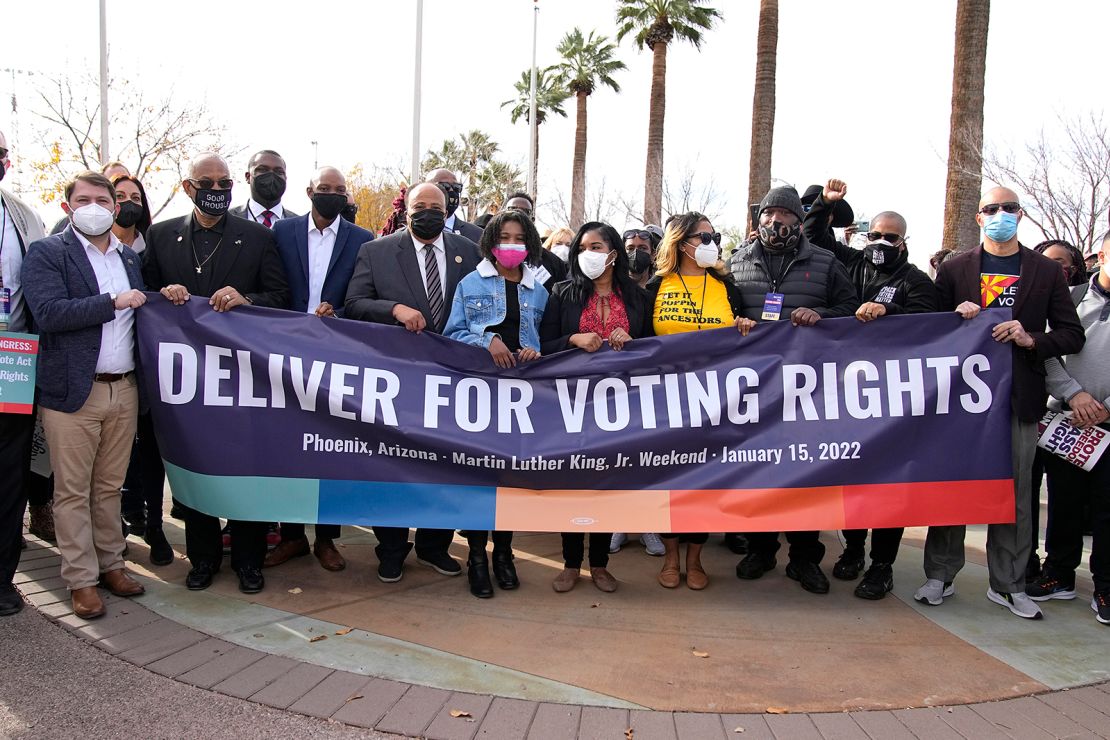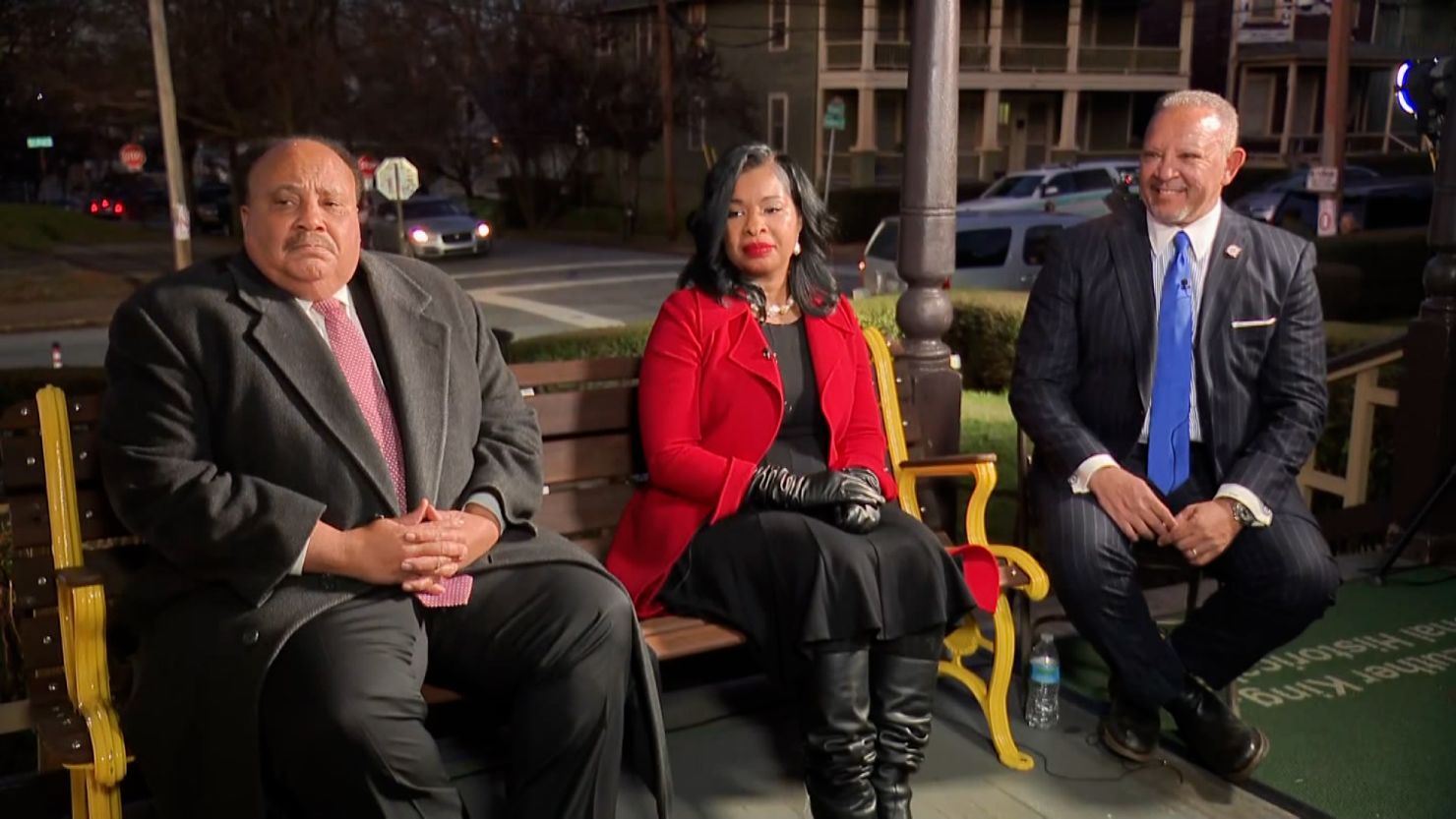Civil rights leaders are vowing to keep pressure on Congress to pass voting and election bills and to honor Martin Luther King Jr.’s legacy, in the face of Senate delays on the legislation.
For Martin Luther King III, son of the late civil rights leader who would have turned 93 on Saturday, “the stakes could not be higher to protect and expand” his father’s legacy as the national holiday honoring him approaches Monday.
“Senators now face one of the most existential choices of their tenure: protect our voting rights or go down in history as an enabler of voter suppression,” King said in a statement last week.
The Senate is expected on Tuesday to take up the voting legislation, which Senate Majority Leader Chuck Schumer had previously pledged to vote on by Martin Luther King Jr. Day. And though the New York Democrat cited Covid-19 and an impending winter storm as reasons to push the vote, Democrats are desperately searching for a way to pass the legislation amid pressure from President Joe Biden while facing grim odds in their own party.
Influential moderate Sens. Joe Manchin of West Virginia and Kyrsten Sinema of Arizona, two Democrats who have long expressed opposition to changing filibuster rules – necessary to get the bills over the finish line – remain unmoved.
King, who has held discussions with Manchin on the issue but has not been able to secure a meeting with Sinema, said he is disappointed by the senators’ stance.
“History will remember Senator Sinema unkindly. While Sen. Sinema remains stubborn in her ‘optimism,’ Black and Brown Americans are losing their right to vote,” he said in a statement on Thursday. “She’s siding with the legacy of Bull Connor and George Wallace instead of the legacy of my father and all those who fought to make real our democracy.”
CNN has reached out to Sinema’s and Manchin’s offices for comment.
‘Now deliver for voting rights’
On Saturday, the King family marked Martin Luther King Jr.’s birthday in Arizona, where they made their latest push for the President and Congress to pass the voting rights legislation.
“Today, on my father’s 93rd birthday, we are not here to celebrate,” King III stressed. “We are here to issue an urgent call to President Biden and the Senate…” he explained, to pass two measures aimed at strengthening voting rights nationwide, the Freedom to Vote Act, and the John R. Lewis Voting Rights Advancement Act, and “a dire warning to the entire nation that our democracy stands on the brink without it,” King III added, before a crowd at Eastlake Park Amphitheater in Phoenix. “Earlier this week, the President said he’s tired of being quiet about voting rights. Well, we are tired of being patient.”

On the federal holiday honoring the late civil rights leader, the Kings will take their fight to the nation’s capital, where they will gather with other activist groups and march toward the Frederick Douglass Memorial Bridge. Their message to Biden and Congress: “You delivered for bridges, now deliver for voting rights.”
“We saw what happened when he used the full weight of the White House behind something,” Arndrea Waters King, the wife of Martin Luther King III, told CNN of Biden’s influence on congressional negotiations that led to the bipartisan infrastructure law.
“What we are simply saying is that we want to see that same full weight, the same full power being used behind the protection of our voting rights,” Waters King said, speaking with CNN’s Suzanne Malveaux, at Martin Luther King Jr.’s birth home in Atlanta.
Biden has thrown his full support behind changing the Senate filibuster rules to pass the legislation, delivering a forceful speech in Georgia – a state that has been an epicenter of the civil rights movement and is now a battleground for voting rights – and making a trip to Capitol Hill to press his party to act. But the President has conceded that he is unsure whether Democrats will be able to succeed – though his administration, Vice President Kamala Harris told CNN on Friday, will “keep fighting.”
Civil rights leaders have also vowed to not back down.
“The President, of course, has a stake in the Voting Rights Act because he cannot win without it,” the Rev. Jesse Jackson recently told CNN. “The stakes are very high in this situation.”
‘Tremendously disappointed’
Born January 15, 1929, in Atlanta, Martin Luther King Jr. organized protests and marches for civil rights, practicing nonviolence while often facing violence himself. A prominent leader of the civil rights movement, King also mobilized for voting rights.
He helped to organize the 1965 march from Selma to Montgomery, Alabama, a day that became known as “Bloody Sunday,” and another march on the Edmund Pettus Bridge two days later. Those demonstrations became the catalyst that led to the signing of the Voting Rights Act of 1965 nearly five months later.
He would continue to fight for civil rights until his assassination on April 4, 1968.
King said his father would be “tremendously disappointed” to find that the fight for voting rights is still underway.
“Discouraged? I don’t think he ever would embrace the energy of discouraged. Disappointed? Greatly, tremendously disappointed,” he told Malveaux at his father’s birth home. “He never gave in and gave out, but disappointment? Yes. He would be greatly disappointed and say that America can, must and will do better. He would never have accepted what we’re going through at this point.”
King told CNN it is “insulting” to still be demanding voting rights after his father and others had fought for them during the civil rights movement.
“Many of us thought that this was done,” King said, adding that he had known there would be obstacles after a 2013 Supreme Court ruling gutted the Voting Rights Act. “The fact of the matter is you make an assumption that in 1965 this should have been done for once and for all.”


